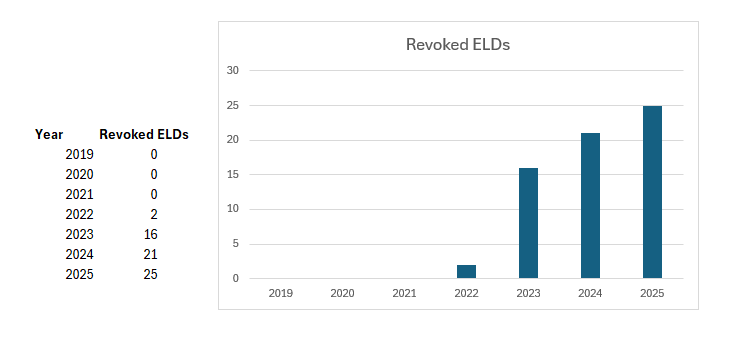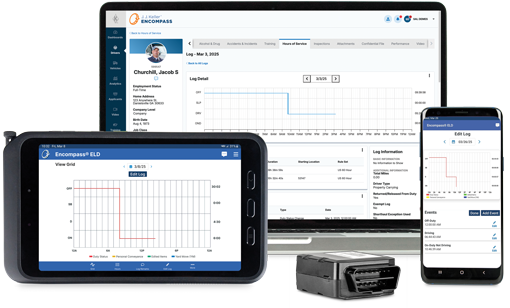Sr. Transportation Safety Editor — J. J. Keller & Associates, Inc.
The Compliance Wake-Up Call: What FMCSA’s ELD Crackdown Means for Fleets and What Comes Next
The FMCSA has significantly increased its scrutiny of electronic logging devices (ELDs). Here's what this means for fleets.
Published On: 10/20/2025


Written by:
Daren Hansen
In 2025, the Federal Motor Carrier Safety Administration (FMCSA) has significantly increased its scrutiny of electronic logging devices (ELDs), removing dozens from its list of registered models. These revocations—based on failure to meet technical specifications under 49 CFR Part 395—are not isolated incidents. They reflect a broader shift toward rigorous enforcement and a renewed emphasis on data integrity, traceability, and audit-readiness.
For motor carriers, this is a wake-up call.

A Year of Revocations: The Numbers
Since January, the FMCSA has removed more than 20 ELDs from its approved list. Each removal triggers a 60-day grace period for motor carriers to replace the device. After that, continued use results in violations under 49 CFR 395.8(a)(1)—“No record of duty status”—and drivers may be placed out-of-service under Commercial Vehicle Safety Alliance (CVSA) criteria.
Rather than listing specific providers, the FMCSA maintains a public record of revoked devices here. This list is updated regularly and reflects the agency’s evolving enforcement posture.
Behind the Scenes: Compliance Testing Standards
The FMCSA’s ELD Compliance Test Procedures outline how devices must be evaluated against the technical specifications in Appendix A to Subpart B of Part 395. These include:
- Vehicle Interface Testing: Ensures synchronization with the engine control module (ECM).
- Data Transfer Validation: Verifies secure and reliable transmission to enforcement officials.
- Edit Traceability: Requires annotated and certified log edits.
- Startup and Monitoring Procedures: Confirms consistent duty status recording.
This increased scrutiny has exposed gaps in smaller providers’ ability to maintain compliance, especially when rule interpretations vary at the granular level.
What Robust Testing Looks Like
Some providers have taken a proactive approach to compliance testing, running hundreds of automated and manual tests with every ELD release to ensure alignment with FMCSA standards. For example, J. J. Keller conducts over 300 automated tests per release and maintains an annual third-party certification relationship in Canada, where one-third of the full protocol is externally validated each year.
This kind of rigor isn’t just about passing a checklist. It’s about building systems that can adapt to evolving interpretations, respond quickly to FMCSA inquiries, and maintain trust with regulators and customers alike. It’s also about being available, whether that’s through documentation, training, or live support from a team that understands the regulatory landscape and speaks your language.
What This Means for Fleets
For motor carriers, the implications are significant:
- Operational disruption: Switching devices mid-cycle can be costly and confusing.
- Audit risk: Using a revoked device—even unknowingly—can trigger violations.
- Driver impact: Out-of-service orders affect morale, scheduling, and retention.
This is more than a compliance issue. It’s a reputational one.
What to Look for in an ELD Provider
In this environment, fleets are re-evaluating their technology partners. The question isn’t just “Is this device compliant today?” but “Will this provider still be on the list tomorrow?”
Key considerations include:
- Longevity: Providers with a history of regulatory alignment are less likely to be revoked.
- Transparency: Clear documentation, traceable logs, and responsive support matter.
- Robust Testing: Providers who follow FMCSA’s full compliance test procedures—and go beyond them—offer greater assurance.
- Dual functionality: Devices that combine ELD with GPS tracking, fault code monitoring, and IFTA/IRP reporting reduce complexity and cost.
- U.S.-based support: When questions arise, having access to a knowledgeable team that understands both the technology and the regulations can make all the difference.
A Common-Sense Path Forward
As the FMCSA continues to refine its enforcement strategy, fleets need solutions that are built for stability, not shortcuts. Providers who have weathered regulatory change before, who understand the nuances of compliance, and who offer more than just hardware are quietly becoming the industry’s go-to.
In a time of uncertainty, common sense looks like:
- A device that’s built to last.
- A platform that’s audit-ready.
- A partner that’s been here before and will be here tomorrow.
If your team is reviewing its current ELD setup, this may be the right moment to ask: Are we aligned with where compliance is headed, or just where it’s been?
You may also enjoy the following articles:
Sign up for our newsletter!
We'll help you stay on top of regulations, best practices, and fleet industry news. Sign up to receive a monthly email notification with links to our most recent blog articles, free resources, and event invites.
